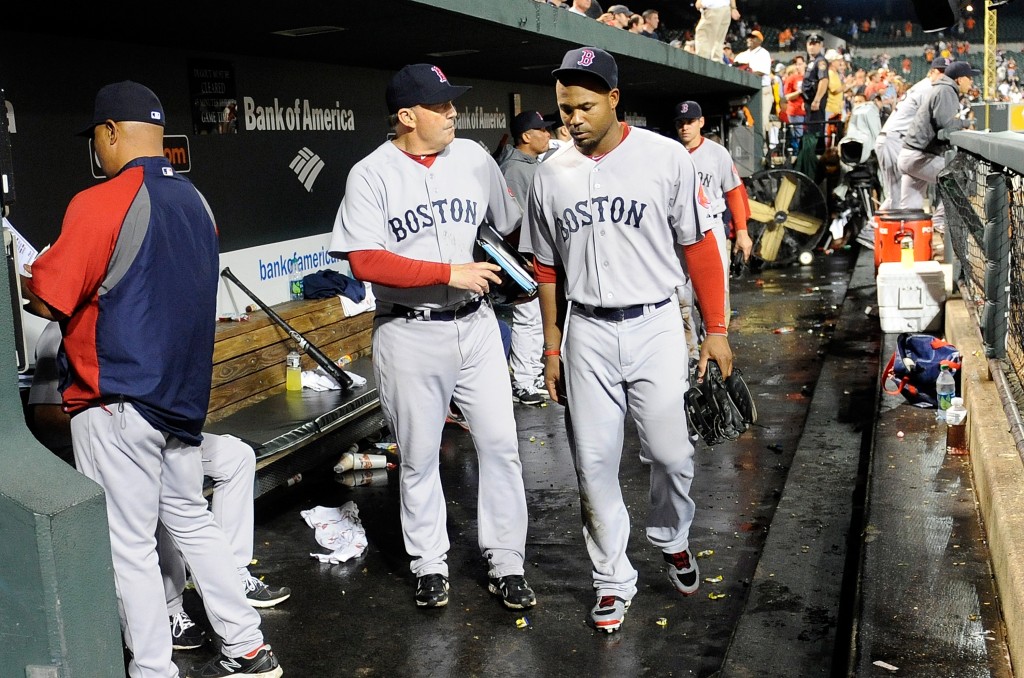Boston Red Sox collapse story: Globe’s anonymous sources
The big story in sports today is Theo Epstein jumping from the Boston Red Sox to the Chicago Cubs, but the big story in sports journalism circles is “Inside the collapse,” a Boston Globe story that attempts to explain the Red Sox’s horrible September.
The piece, by Bob Hohler, uses anonymous sources to unload on pitchers John Lackey, Jon Lester and Josh Beckett, who are accused of slacking off on conditioning and drinking beer and playing video games in the clubhouse during games as the team collapsed, and now-former manager Terry Francona, who is accused of having a problem with pain medication and letting his marital problems affect his job performance.
Francona denied the allegations. The pitchers refused to comment, Hohler writes.
This article is based on a series of interviews the Globe conducted with individuals familiar with the Sox operation at all levels. Most requested anonymity out of concern for their jobs or potential damage to their relationships in the organization. Others refused to comment or did not respond to interview requests.
Whether and when to use anonymous sources is one of the central debates in journalism ethics. It’s a debate that reached the non-journalism-nerd mainstream in the middle of the last decade when New York Times reporter Judith Miller went to jail rather than reveal the source of her story that outed Valerie Plame as a covert CIA officer.
Here’s a New York Magazine story by Kurt Andersen from 2005 that goes deep on the issue of anonymous sourcing.
Watergate is the classic modern case of anonymous sourcing for the good. The public interest was clearly served by Bob Woodward and Carl Bernstein’s stories based partly on information from the anonymous source known as Deep Throat.
But is that the case with the Globe story? The interest of various Red Sox officials who want to spread the blame for the collapse around is served. They got to dump on Francona and select players without having to answer for what they’ve said.
And the Globe has a financial interest in running the story, which baseball fans will eat up in the hundreds of thousands, if not millions.
Andersen’s New York piece, which he framed as a Q&A with a theoretical questioner, gets at the heart of the question of public interest:
Okay, fine, but does the public have a need to know that Katie Couric is high-strung and snappish? A waiter who calls “Page Six” to say that Mary-Kate Olsen didn’t touch her enchiladas is Deep Throat and Richard Johnson is Bob Woodward? Please.
Your view is the line of the chastened journalistic Establishment, which says unnamed sources must be used only when the story is unequivocally consequential rather than merely interesting. “At the very least,” [former New York Times ombudsman Dan] Okrent says, “we can not do it when it’s not important.” Gannett’s policy [a then-new USA Today policy of minimizing the use of anonymous sources] is the same. And this is the nub of the debate. Do you believe unidentified sources are inherently bad, like sugar or capital punishment, a necessary evil to be used as sparingly as possible (and ideally never at all)? Or that granting anonymity is just one more somewhat unattractive journalistic technique—along with badgering and begging and insincerely flattering sources—that should be used as much as necessary and as carefully as possible?
And if the latter, where’s the line? Is the collapse of a baseball team a serious enough matter to let people speak anonymously? The Globe says yes.
Columnist Chad Finn defended reporter Hohler this morning, tweeting, “The debate on anonymous sources will go on long after we’re gone, but Bob is as honest and dogged a journalist as you’ll find, and in a piece about the dysfunction of a team that suffered the biggest sept collapse in history, the info was worth using in that context.”
That quote is cobbled together from consecutive tweets.
I think an argument can be constructed that in Boston, in 2011, the Red Sox’s collapse is an “important” enough story to justify the use of anonymous sources. I’d have to hear the argument. I don’t think Finn made it. He just said the story warrants anonymous sourcing without saying why. I think I would disagree with this argument, but I do think it can be honestly made.
I also think that, even if that argument were made by the Globe, the real argument would be: We’re not going to leave X million page views on the table.
Because if Red Sox management didn’t have the Globe for its platform, it would go down the media line till it finds one, and find one it would. So by not running the story, the Globe would be left taking the high road, the same story would get out to the public, and a lot less money would end up in the Globe’s pocket. Not much motivation for the Globe to take that high road.
What do you think? Is it appropriate to use anonymous sources in a story about a team’s on-field performance? Why or why not? When would anonymous sourcing be appropriate in a sports-related story?
-
Anonymous
-
Franklin Steele
-
Anonymous
-
Franklin Steele
-
Franklin Steele
-
Anonymous
-
Nick Goss
-
Trevor Medeiros
-
Tim Wood


